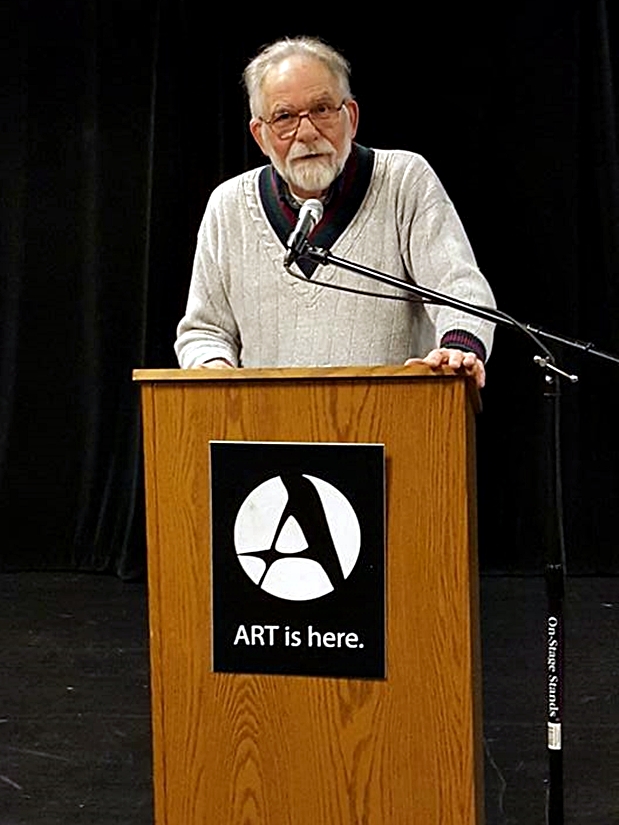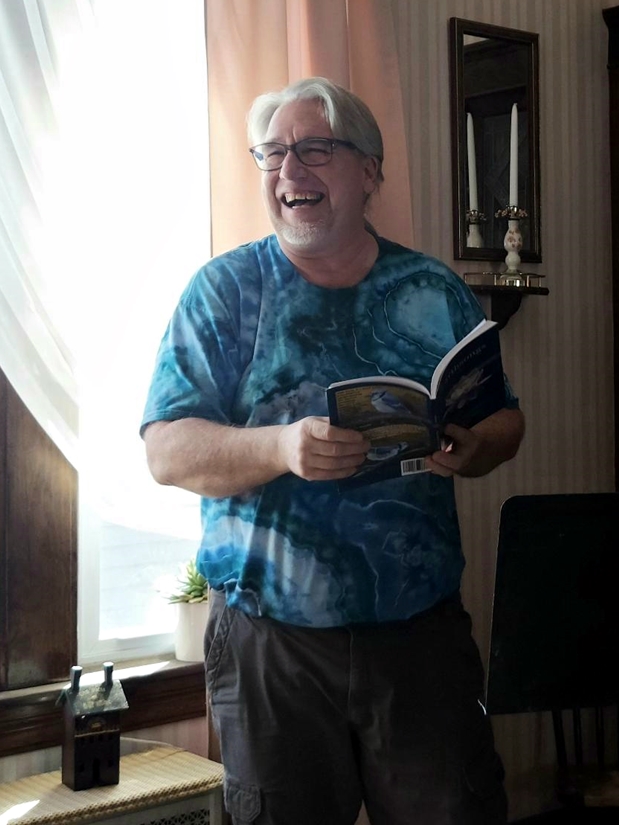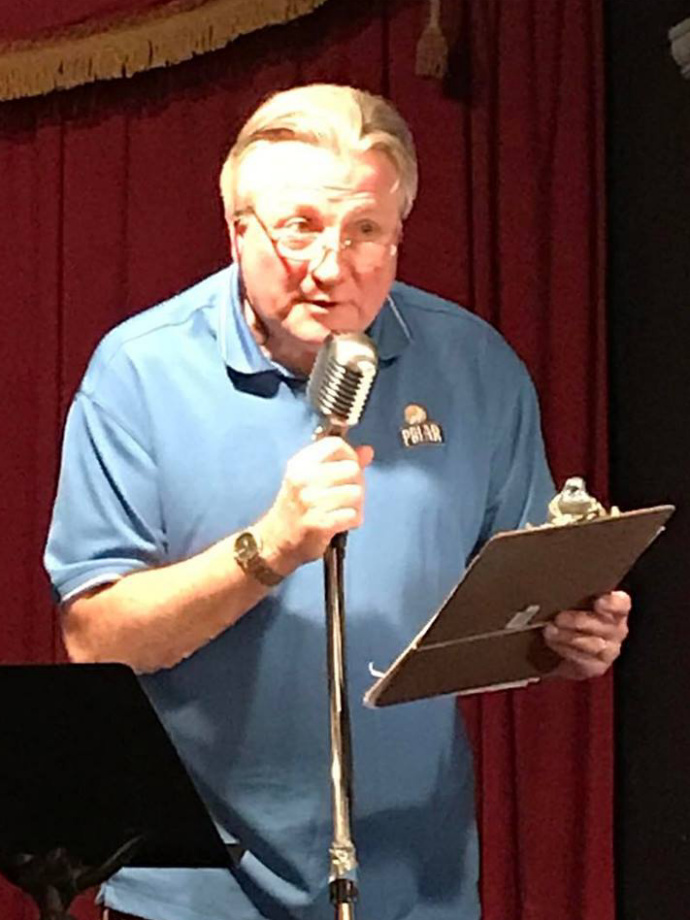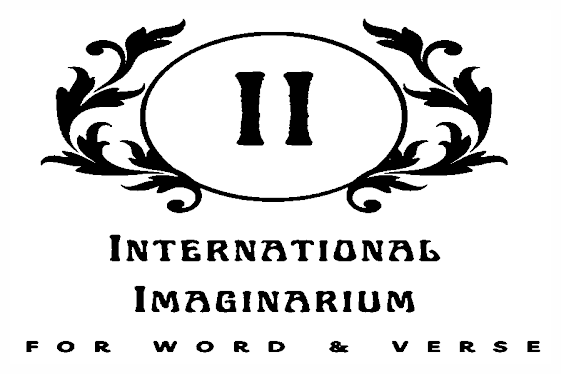International Imaginarium For Word & Verse (May 3, 2023)
 |
| Paul Szlosek (Photo Courtesy of Deborah Jane Mitsakos) |
PAUL: Hello everyone! I want to welcome you all back to the International Imaginarium For Word & Verse after being away for an incredible six months. I do apologize to everybody for taking such an eternity for putting this edition of the Imaginarium together. Since we’ve seen each other last, my life has been a whirlwind of things happening, both good and bad. As you probably heard, I recently caught COVID (I suspect it was at a poetry event in the real world which shows the advantages of hosting this poetry reading completely in our combined imaginations) which totally wiped me out for quite some time, but I’m glad to announce, I have recovered at last. I’m so happy to be here tonight as I peer out into the audience and see a rather intimate group of under a dozen people (of both familiar and unfamiliar faces) gathered here on this rather cool spring evening. Thank you for joining us, I missed you all so much!
We have such a wonderful feature for you tonight, Padmaja Battani a very talented poet from Connecticut, who has frequently participated in both the Virtual Poetorium and International Imaginarium open mics in the past I will be inviting Padmaja up to the stage in just a few moments, but before I do, I would like to officially open this May edition of the International Imaginarium with a short poem appropriately entitled “May and the Poets” written close to two hundred years ago by the19th-century British poet Leigh Hunt…
May And The Poets
There is May in books forever;
May will part from Spenser never;
May’s in Milton, May’s in Prior,
May’s in Chaucer, Thomson, Dyer;
May’s in all the Italian books:—
She has old and modern nooks,
Where she sleeps with nymphs and elves,
In happy places they call shelves,
And will rise and dress your rooms
With a drapery thick with blooms.
Come, ye rains, then if ye will,
May’s at home, and with me still;
But come rather, thou, good weather,
And find us in the fields together.
—Leigh Hunt
And now on with the show! Before I call Padmaja to the stage for our customary Imaginarium interview that always precedes the feature, I’d like to first let you know a little more about her…

Padmaja Battani lives in Connecticut with her husband and daughter. She received an MA in English Literature. Her prose and poetry appeared in Sierra Poetry Festival, Trouvaille Review, New Pages, Coffee People Magazine, League of Canadian Poets, Necessary Fiction, Hamilton Review of Books and elsewhere. Her latest passion is hiking. She is currently working on a Poetry Collection.
Please welcome to our virtual stage, Padmaja Battani!
Well, Padmaja, please have a seat, and make yourself comfortable. Thank you so much for being here! Before we learn about Padmaja Battani the poet and the writer, I think our audience might like to know a bit more about Padmaja Battani the person. Where did you grow up and where do you live now?
PADMAJA: I was born in a small city ‘Anantapur’ in the South part of India. I can call myself ‘a citizen of the world’ as I have lived and worked in four different countries. Newington, Connecticut is my current home. I love hiking and consider myself very fortunate to be living in New England as this area has thousands of miles of trails and you find an abundance of trails to waterfalls, swimming holes, alpine summits, backcountry lodges, lean-to shelters, fire towers, cabins, lakes and ponds.
PAUL: How and when were you first exposed to poetry?
PADMAJA: My early years of reading was all in my language – Telugu. There is poetry everywhere for me – magazines at home, books at school library, poems in language arts classes. I have discovered a great pleasure in reading poetry in three different languages. The poetry which influenced me a lot was ‘Sagar Mudra’ (Impact of Ocean) written in Hindi and Keats’ and Robert Browning’s poems.
PAUL: Who or what first inspired you to start writing poetry yourself?
PADMAJA: Various poets I read ranging from Keats, Robert Browning, Robert Frost, Rabindranath Tagore, and Emily Dickinson.
PAUL: In addition to your poetry, could you please describe the other kinds of writing that you do?
PADMAJA: I have always been interested in writing. Though my favorite is poetry writing, I write short fiction, flash fiction and book reviews. I love writing poetry book reviews. Reading poetry is such a pleasure and I will never miss an opportunity to read the newest poetry collections. I have published about eight poetry book reviews last year in various magazines.
PAUL: Who are some your favorite poets and writers and can you tell us why you like them?
PADMAJA: The list is big. Emily Dickinson tops the list. I her skill in using the images from nature, music and domestic activities to probe universal notions. My recent favorites are Aline Mello, Grace Lau, and Safia Elhillo. Their poems address the otherness, identity, immigration, racism and love. These intricate themes flow well in their poetry unraveling into new dimensions.
PAUL: What do you feel is your primary motivation for writing?
PADMAJA: I want to pour out my feelings, thoughts, and emotions. I want to be heard. Writing for me is a new living. I want the readers to feel like they have been there, they know this feeling/emotion I am talking about. I want my poetry to take them to the place I have been to, to the sea, to the heart of any and all that matters, to see it, to taste it, and belong to it.
PAUL: Could you tell us something about your personal process for writing a poem (especially how you usually begin)?
PADMAJA: Poems come to me in different ways, sometimes a memory inspires, sometimes a news story motivate my writing, sometimes poetry prompts and sometimes deadlines for workshops help me achieve my writing goals. A painting from an art museum resonates.
A first draft will never look the way the idea did in your head. However, a 10th draft might get closer. Iterate, edit and look at each sentence carefully. Slowly, draft by draft, the work will come into its own.
PAUL: If you had to choose just one word to describe all your writing in one word, what would that word be?
PADMAJA: Thought-provoking
PAUL: Do you have a regular writing routine, and if so, can you describe it to us?
PADMAJA: I wish I could. The truth is finding time for my writing is very challenging. Between my day job, mother duties (I have a tween-age daughter) I try to utilize whatever free time I can avail of.
PAUL: What would you consider your ideal writing environment?
PADMAJA: Oceanside, raindrops drumming on the rooftop and aroma of coffee.
PAUL: Could you tell us about any poetry or other writing projects you are currently working on?
PADMAJA: Currently I am working on a Poetry Collection. Also working on starting a literary magazine.
PAUL: What advice would you give to someone who is just starting out writing poetry?
PADMAJA: Learn to enjoy the process of writing. Keep a notebook and write it in every day. This could be anything – ideas, overheard conversations, your thoughts and feelings. In about three or four months, you will have a book full of material that you can use for writing poetry.
Spend time in beautiful places with wonderful and fascinating people. Let your mind wander often and create your own worlds. Pour everything out into writing when your imagination is overflowing with color, texture, and light.
Finally, send your work out into the world, even if it is not perfect. Give your work an audience. Read it aloud to others; send it to contests and magazines, even if you think it is not yet perfect. Knowing that a real person will be on the receiving end of your words will force your brain to shift slightly, so that you will begin to see them more objectively, as an outsider would, and thereby tap into what makes your voice unique
PAUL: So unless someone in the audience has a question… no?…well then, I guess that concludes the interview portion of our program. Padmaja, thank you so much for such an engaging and thought-provoking interview! Now, folks, please give our featured poet Padmaja Battani a tremendous round of applause as she walks to the podium to present her poetry…
PADMAJA:
A Song Visits My Dream
A song visits my dream
A song with muted lips
I hear its lyrics with my heart
A song with wings and no words
That touches my mind swiftly
And breathes life into my world
A song unheard before
Neither written nor composed
But imagined in a dream
A song so powerful
That never ceases to chase
My spirit to define my existence
And to decide my own path
—Padmaja Battani (originally published in Trouvaille Review)
Oceans Apart..
Every morning I wake up to the aroma
Of freshly brewed coffee, just like when
I was a little kid in my home
And the first thing that comes to my mind is
That I have never tasted
The coffee made by my mother
And may never get to taste it
Many things and many moments
Remind me of my home, my mother
Though sometimes there is no obvious relevance
My wife is so different from my mother
And she is so like her in many ways
I am very fortunate to win their love
And it’s unfortunate that they will never know each other
The way I know each of them
Tough to believe that my mother
Capable of loving anything and everything I like
Could be so callous towards my love of life
Irrationally succumbing to notions of
Religion, race, color, caste
Difficult to forget the words she said
Persuading me to surrender my love
‘Go, marry her; never show your face again
Never bring her near me
You are dead for me…’
I know, there are and will be a lot of things
And moments that remind my mother of me
And an immense pain that accompanies
Though oceans apart, we revive same love
Relinquish to same memories
And carry same agonies
—Padmaja Battani (originally published in Coffee People Zine)
An Evening of Rain
You saw me walking
In the rain holding
My broken umbrella
Folded and inoperable
Rainwaters ruthlessly
Drenching me
Once I used to enjoy
The rain, splashing water
Caressing my face,
Aroma of rain-soaked
Earth filling my heart
You invited me into
Your humble haven
Offering a worn towel
To dry my dripping hair
You made tea
And handed a steaming
Cup with an apology
For missing sugar and milk
Raindrops drumming
Accustomed tunes,
Warmth from your smile
And the tea tasted
Precisely like the one
Mother used to serve us
When there was no supper
—Padmaja Battani (originally published in Trouvaille Review)
Your Expedition
You made tea for your brother
Every morning when he was preparing
For his public service exams and never
Received a word of appreciation
For the steam cup of beverage
You borrowed your friend’s den
Locking yourself in for hours
Scribbling down on a screen
With a hope to voice your opinions
In a noiseless mode
You watered the flower plants
In your front garden religiously
And did not mind neighboring girls
Decorating their hair with the rosy blooms
And enjoyed their beaming smiles instead
You buried the grief
Inside a deep hole of your heart
And embraced a brave face saying
“Everything is going to be fine
You will need to move on…”
You read Toni Morrison’s Sweetness
And shed a river full of tears
Not sure whether the tears were meant
For Lula Ann or for her mother
You sliced onions, peeled garlic
Ground the spices and cooked the curries and
Biryanis and felt the fullness in your stomach
When the family gobbled up every single morsel
You conquered ‘Lamentation Mountain’
And reclaimed your hiking quest
After a decade long break that was
Immersed in work and family tasks
You joined Capital community college
Studying computers and information systems
And took pride in comprehending
Database designs and process flows
You received a ‘Thank You’ note that
Conveyed gratitude for your
Recent blood donation that
Could save the lives of up to three people
You write regularly for your blog
That has less than fifteen followers
And hope that the winged words
Will fly to a million browsers someday
—Padmaja Battani (originally published in Bitchin’Kitsch)
A Saga of Silence
Moments of silence flow
Into minutes, days, months and years
Sometimes, I am muted involuntarily
Sometimes, my words are
Transformed into tranquility willingly
Sometimes, my yearning to holler
Dies on a deaf heart
Sometimes, I am not sure
Whether I deserve to speak
Most of times my words fo
Wings and fly away to distant lands
And yet
No one ever identifies my silence
Not a soul persuades for my words
—Padmaja Battani (originally published in Tarot Review)
Dreams Know No Dying
Every night I kill my dreams
Strangle all aspirations
And console my heart that
I do not deserve them
Condemn my impulsive self
For being naïve and considering
Unattainable apparitions
Overlooking worldly ways
And every morning I wake up
To see saplings rising
From floundered dreams
Sprigs flourishing
From flogged hopes
Beaming and eager to bloom
—Padmaja Battani (originally published in Tarot Review)
PAUL: Wow! That was just so great, Padmaja! Everyone, let’s show our appreciation for such an incredible feature by putting our hands together, and giving a rousing round of applause for Padmaja!
Normally we would be taking a short intermission in a few minutes before we come back with our virtual open mic, but since we only have seven poets in our open mic tonight, we will be skipping the break tonight.
But before we start the open mic, it’s time once again to present this month’s Imaginarium group poem. You might recall we have often rewrote the classic Wallace Steven poem Thirteen Ways of Looking at a Blackbird as our group poem in the past, but substituting other things for the blackbirds such as umbrellas and dandelions This month, we once again used that classic poem as a template, but this time we used manhole covers as our subject. The way it worked was all our participants sent us one to eight lines containing either the phrase “manhole cover” or “manhole covers”, and then all contributions (which like always will remain anonymous unless otherwise requested) were numbered and compiled into the following poem which I entitled “Seven Different Ways of Looking at a Manhole Cover” …
 |
| Photo by Paul Szlosek |
Seven Different Ways to Look at a Manhole Cover
I.
Among the busy city streets
The only things not moving
Were the manhole covers.
II.
My mind was split thricely
Like manholes
On three divided streets
III.
From below the manhole cover
Appears to be the gate of the overworld,
From above, the underworld.
Are heaven and hell separated
By the steel disc of a manhole cover
Or are they connected?
IV.
Among the concrete slabs
The only circle I see
Is that of the manhole cover
It holds back gravity
Concealing a black hole
Squeezed into this space
Beneath a manhole cover.
V.
He rode over a manhole cover
In an old car
He dreamed of manhole covers for weeks.
VI.
I have often mistaken manhole covers
For subway tokens of the Gods
Or Superman’s rusty Frisbee.
VII.
There once was a missing manhole cover.
At which a curious fellow would hover
He fell into the murky mucky dark hole
As he lost all control,
“Mercy me” he cried to discover his lover.
—The International Imaginarium Group Poem for May 3rd, 2023
I want to thank Robert Eugene Perry, Howard J Kogan, Angela (aka Poetisatinta), Tim McCarthy, and the others who wish to remain anonymous for contributing and making the preceding poem possible: You guys are the best!
Okay, I am going to kick off tonight’s open mic with another poem about May, our group poem from the May 2022 Virtual Poetorium with contributions from Karen Durlach, Ariel Potter, Tom Ewart, Robert Eugene Perry, Howard J Kogan, Selma Martin, and Angela (aka Poetisatinta)…
May Is the Month…
May is the month,
Most pleasant passage
Spring coolness bridged
To Summer’s swelter
Offering a brief glimpse
Of a temperate paradise.
May is the month
To take nature by the hand
Dancing into silent space
Wearing blossom as a gown
And hawthorn
As your
Crown.
May is the month
Of our mothers and May flowers,
Of forsythia and bloodroot,
Violets and sentimentality,
Both genuine and commercial.
May is the month
To tend the garden,
Pull the tools from the shed,
Pinch the weeds from the ground,
Watch your arteries as they harden,
Probe for parasites that are ahead
Of time, boring into the soiled bed
Of your body, leaving you to cast around
For straws that won’t leave you dead.
May is the month
I mourn my mother,
Alive but estranged,
Close in miles
But faraway in heart.
May is the month
Of war on Ukraine
And here at home the war
On the last seventy years
Of progress in democracy.
It’s a May that makes me mad.
May is the month
The air conditioner goes in
And we are not yet
Sick of the heat.
May is the month
The cat escapes onto the air conditioner
And balances on the box outside the window
Until tempted back inside with a bowl of cool milk.
May is the month
My beloved and I sip
Lime rickeys, listening
To a creepy podcast
While the box fan spins.
May is the month
You begin to sweat at the bus stop
(Masks suggested but not required)
As people board the WRTA
Bound for downtown.
May is the month
Sweaters go ignored
At the Goodwill, and
Thrifters sort through
Secondhand sunglasses and visors,
Shorts and sun hats.
May is the month
Of come what may,
Swan song for Spring,
Harbinger of Summer.
May is the month
Of maybes, but a maybe that will be:
There be rain, there be sun
There be color, there be breeze.
There be hellos, there be smiles
There be you, and there be me.
There be less worry, there be more love
There be fecundity, there be more hope.
May is the month
Of “May Be”:
May you be safe
May you be healthy
May you be happy
May you be blessed
May you find peace
May you find courage
May you find joy
In May, may you Be.
May is the month
Of may we, oh! may we unfurl our treetop leaves to bask in the sun?
May we, oh! may we thrust our tender green tips out through warmed soil?
May we, oh! may we blossom brightly and smile,
Welcome widely to dragonflies, butterflies, wasps, and bees?
Yes, oh yes!
May is the month of YES.
—The May 2022 Virtual Poetorium Group Poem
Now before I introduce the first person on the open mic tonight, I have a bit of a disclaimer or rather an explanation to make. As you know the International Imaginarium does not operate in the real world, but our collective imagination, thus it does not follow real time. Many of our poets in the open mic were expecting this edition to be in January (not knowing there would be a delay of six months) so that is why we’ll be hearing quite a few poems about Chistmas and New Years in the month of May.
And now please welcome our first poet tonight in the open mic to the podium, long-time regular Howard J Kogan, who will be one of two featured poets (along with Therese Gleason) in a special double feature at our real-world poetry reading series, the Poetorium at Starlite, in Southbridge, Massachusetts at the end of this month…

HOWARD:
Words
I wonder what words think of each other, do they have feelings?
Do black and white, up and down, big and small eye each other
suspiciously, envy one another, keep their distance?
No doubt peace and war love and hate are drawn to each other,
maybe they double date and peace and love, hate and war spend
all night talking to each other, find they have a lot in common.
Though some chemistry is missing and they go home paired as they came.
Are A-words the country club set? Do they look down on words
further down the alphabet? Do they consider etymology
when they’re deciding where to go to school?
Do new words have a hard time finding an apartment, getting a job?
How do they feel about being in our mouths?
Being held at the tip of our tongues then blown into thin air.
Do they know how much pain they can cause?
How much pleasure they can give?
How lost we would be without them?
—Howard J Kogan
About Time
You would think after all this time,
time itself would make a difference,
but what is time? A silent witness
indifferently calculating the length
of a day or a love or a life.
Why expect anything of it,
time doesn’t care or hope or dream.
It is an observer from another dimension
disguised as a clock
with nothing but time on its hands.
—Howard J Kogan
PAUL: Thank you, Howard! Our next poet is the founder and organizer of the Slightly Off-Beat Poets reading series. Please welcome our good friend of the Imaginarium, Robert Eugene Perry…

BOB: Here are three poems published in the January 2023 edition of the online journal The Academy of the Heart and Mind…
A.I. Imitates Life
I can no longer tell if I am
jacked into a real time simulation or
a simulation of real time.
Pulled into technology’s orbit
cellular satellite of my soul, image
enhanced beyond measure – attempting
a play at real life, I pause my AI music stream –
silence ensues.
Is my real life enhanced by AI or
has AI become my life, occasionally
paused to assimilate data
and attempt an attempt
at communication?
This world, beautiful beyond measure
can so easily become just a backdrop
to our constant needs, our feeds,
scrolling past each fragrant flower
missing nuance, romance, tender-
ness, tangled up in a virtual web
mess we miss our real chance
at connectedness.
—Robert Eugene Perry (originally published in The Academy of the Heart and Mind)
reaching out
field of clovers
glacial rock
under stars
teenage angst
calling god
on the carpet
thousand questions
rapid fire
fill the void
breaching silence
pumping fist
in defiance
anger ebbs
leaving sadness
dissolution
dawn is breaking
driving home
crooked smile.
—Robert Eugene Perry (originally published in The Academy of the Heart and Mind)
Entering Twilight
Less seen, seen less
Shadows creep, sleep forms
Fox stirs, barn own calls
Crepuscular, one and all
In between, lesser known
Clouds lengthen, dusk descends
Ducks squawk, river rolls
Gathering the gloaming in
Breathe deep, drop down
Time shifts, space bends
Ancestors all around
Slow down, the veil is thin.
—Robert Eugene Perry (originally published in The Academy of the Heart and Mind)
PAUL: Thanks, Bob! Now please welcome Worcester-area poet, humorist, and host of the Poetry Extravaganza reading series at the Redemption Rock Brewery in Worcester, Joe Fusco Jr.…

JOE:
Joe the 4th
No one laughs like Joseph Paul Fusco IV.
It consumes his being, head to toe, deep and loud, ‘till you can’t help but join in the revelry.
He bellows at his dog Sinatra as he tries to eat bread that’s been placed on his doggie nose.
He guffaws at his Dad’s imitations of Disney characters, especially Goofy.
He howls at his Papa’s poor rendition of Dracula’s ‘I’ve come to drink your blood.’
I’ve never seen a three-year-old spread so much joy to the world.
As a glass-half-empty older adult, I thank the heavens for the privilege of being his grandfather.
He’s Joseph Paul Fusco IV. He is extra-ordinary!
—Joe Fusco Jr.
PAUL: Thank you, Joe! Now please welcome a poet who I believe is making her debut at The International Imaginarium, reading a poem inspired by one of the photos from the Imaginarium Photo Poetry Prompt Project, Mary Jo Moore...
MARY JO:
Learning to Hula Hoop
Don’t be so foolish
as to compete with a kid
at hula hoop.
Go outside
where you can be alone,
place that mother
around your hips
and see what’s possible
without copying anyone else,
especially a kid.
Practice for twenty minutes
max, then go back in.
and have a rejuvenating snack.
Stretch, bend, stretch, bend,
then go outside and try again.
Repeat for two hours
Do it again the next day.
Cancel your appointments.
This is more important.
Give it a few weeks
and you’ll be ready.
Hey, kid.
Show me how to hula hoop.
Then amaze that kid with
what a quick learner you are.
—Mary Jo Moore

Photo by Paul Szlosek
PAUL: Thanks so much, Mary Jo! Now please give a warm welcome to a frequent contributor to the Imaginarium traveling all the way from Southport, North Carolina, Ami Offenbacher-Ferris (known to her close friends and relatives as Gypsie)…

GYPSIE:
New Year’s Resolution(s)
First resolution of the new year,
not to make a New Year’s resolution.
Second resolution for the new year,
oops, broke the first one already.
Damn! Rewrite!
First resolution of the new year,
not to make New Year’s resolutions
that I will break. Make and keep
all expectations plausible.
Good! Doable!
Second New Year’s resolution,
stop checking and rechecking
phone messages every fifteen
minutes in case he called.
Tough! Achievable!
Third New Year’s resolution,
keep the perusing of emails
at least thirty minutes apart,
in case he’s written.
Harder! Feasible!
Fourth New Year’s resolution,
stop clicking over to my text icon
constantly verifying I have not
missed his text.
Conceivable! As soon as I check my text just to make sure …..
—Gypsie-Ami Offenbacher-Ferris
Think Not
Think not that my skin is pocked
and mottled because I am unclean.
Believe if you will that it is my doing
to have a face riddled with red bumps, wide open pores and scars.
Think not that I am gluttonous
and have no will to avoid food’s
laced with fat and many calories.
Or that I eat to fill a void caused
by the thing I am trying to assuage.
Think not that I walk with a cane
and a limp to garner attention otherwise never given to me.
The slight frown upon my face
denotes my physical pain, not disdain.
Think not that I notice your gaze
upon the bosom of other women,
while mine never came to be.
I am aware of this shortcoming,
no need to reiterate it with clichés.
Think not that I am not a woman
of intellect and hard-won knowledge,
an interpreter of the Great Works.
Think not that I am weak due to these
gifts perceived as curses. I am strong.
—Gypsie-Ami Offenbacher-Ferris
Not A Dog
You came to me at only five weeks
old, moved my soul, changed my life.
A tiny thing with coal black fur,
bright blue eyes and the feet of a bear.
Stole the hearts of all around, crashed
all my barriers and helped me ground.
A tiny pup of questionable lineage,
no one wanted lest you were vicious.
Though not a mean nor aggressive
note did your little Wolf heart possess. Not once did you bark
or even protest. Loving licks always.
—Gypsie-Ami Offenbacher-Ferris
PAUL: Thank you, Gypsie! Our next poet is someone we haven’t seen since we changed our name from the Virtual Poetorium, please welcome back, Mishelle Goodwin…
MISHELLE:
Three Wishes
There is a clock on a wall tick-toc-tic
Christmas time until the clock strikes 12
goes cookoo- 12 times joy and laughter
So many people bringing joy and laughter
If you have any songs or cheers to use
Your at the same house, I am inside with my family.
We travel a lot mostly in the summer.
When I was young we went to
Santa’s house called at all villages of your life,
in my home town every year we did something new.
—Mishelle Goodwin
PAUL: Thank you, Mishelle! And now last but not least on our open mic, please welcome, Karen DurlacH!
KAREN:
Rare and Precious
[A Tale of Two Museums]
[ONE: behind the scenes in the natural history museum]
Please, please don’t
shoot our rhinos
said the curator of mammal collections.
Even though their horns are fake,
some crazy will smash the windows, break the locks.
No, no,
no photos of our dead rhinos, please.
[TWO: special exhibit in the fine art museum]
Clara lost her horn—probably the stress—
captured young, sent sailing in 1741
from India to Rotterdam,
toured all of Europe
—if you like that sort of thing—
gawked at by thousands, royalty and low,
touched by fingers for some extra coin.
The first rhino seen in the “civilized” world
was not protected by the armor of knights
as engraved by Dürer in 1515
and plagiarized in fantastical iterations for centuries,
a second horn on its back.
No, poor Clara
vulnerable and venerated,
lonely, probably seasick and scared,
immortalized in handbills
and the anatomy books of Albinis
as mere background image to humans,
exotic, unique, misunderstood.
—K. Durlach
PAUL: Thank you, Karen! Well that concludes tonight’s open mic. I want to thank everyone who read tonight including our feature Padjama Battani as well those who contributed to our group poem!
Well, I am now going to close out the show like I usually do with a poem of my own. The following piece was originally published in the Fall/Winter edition of Soul-Lit…
The Real Reason
The real reason we allow our children to have pets,
Claims the voice which has recently taken residency
In the sub-basement apartment of your psyche,
Has nothing to do with the old myth about teaching them responsibility.
How can you deny this is not so, persists the voice,
Evidence perforates your fingers, scars from jagged lids
Of a thousand cat chow cans, proving you, not they,
Actually feed and care for Fluffy.
And why do we insist on giving them goldfish and gerbils,
Critters with limited life spans?
Why not beings with guaranteed longevity,
Parrots or Galapagos Island tortoises?
Because we are counting on their quick demise,
That’s why. We are setting our little darlings up for heartbreak.
We need an example, the first part of an analogy in order
to explain the fate of their great grandfather:
“Now Joey, Now Melissa, you remember what happened to Snowball
Last summer? Oh no, great grandpapa didn’t have kittens.
Oh no, he didn’t get run over by a car either but it’s about the same.
He’s going away in the ground for a while, oh yeah, it will be
Much bigger than Snowball’s shoebox, but we aren’t going to see
Him for a long, long time,” and then we coil our arms around our offspring,
While simultaneously patting our own backs, so smug and satisfied
We have prepared them for this emotional crisis.
Yet do not believe the voice, it may not intentionally lie,
But it does not understand, it does not remember being a child,
Sobbing, in retreat from a scolding or nursing a scraped elbow,
Curled up on a concrete stoop and having your posse of pets
Gather instinctively around you, the comfort of burying your face
In their soft warm fur, the sensation of the emery board tongue
Lapping the salt water from your flushed cheeks, the purring,
An almost mechanical song as soothing as a lullaby,
The wagging of tails as rousing as thunderous applause.
Their love and affection, natural and unconditional did not
Depend on your grades or how you behaved in public.
Oh we remember, and because we treasure our children,
We want to shower them with a much love as we possibly can,
Even though it may not be our own. That, I argue, is
The real reason we allow our children to have pets.
—Paul Szlosek ( (originally published in Soul-Lit)
Well, good night everyone! I hope that you enjoyed this very tardy edition of the International Imaginarium For Word & Verse. Not sure when the Imaginarium will be back again since my life is still fairly hectic right now (perhaps sometime later this year in either late Summer or early Fall?) but I’d love to see you all at the end of the month on May 25th for our special double feature with Therese Gleason and Howard J Kogan at our live Poetorium at the Starlite show in Southbridge… Until then, please take good care of yourselves!

Comments
Post a Comment